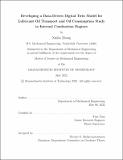Developing a Data-Driven Digital Twin Model for Lubricant Oil Transport and Oil Consumption Study in Internal Combustion Engines
Author(s)
Zhong, Xinlin
DownloadThesis PDF (18.26Mb)
Advisor
Tian, Tian
Terms of use
Metadata
Show full item recordAbstract
Nowadays, internal combustion engines face significant challenges stemming from stricter emission regulations and from the introduction of propulsion systems that use alternative energies. Given its wide adoption and its apparent irreplaceability in the short term especially for the heavy duty sector, further efforts are required to reduce engine emissions. An important step towards this ultimate goal is to deepen the understanding of the lubricant oil transport process in the piston ring pack system given that oil consumption is one of the major sources of engine emission.
This thesis aims to develop a baseline Digital Twin model for the piston ring pack system to study oil transport and oil consumption behaviors in an internal combustion engine, operating under the "healthy system" assumption to establish a lower-bound value of the properties of interests. The model uniquely combine a machine-learning based gas flow model to resolve the complex gas flow patterns within the piston ring pack, which is then coupled with a numerical solver to model the long term oil-gas interaction and subsequently determine the oil consumption rates. Extensive parametric study is performed and results of which demonstrate the effectiveness of the model for a wide range of different engine boundary conditions. The model can be used a tool to study how different engine designs and operating conditions influence oil transport and oil consumption, providing a convenient and cost-effective alternative to expensive engine tests. The output of the Digital Twin can be considered as the ultimate goal which future engine designs should strive to achieve.
Date issued
2022-05Department
Massachusetts Institute of Technology. Department of Mechanical EngineeringPublisher
Massachusetts Institute of Technology